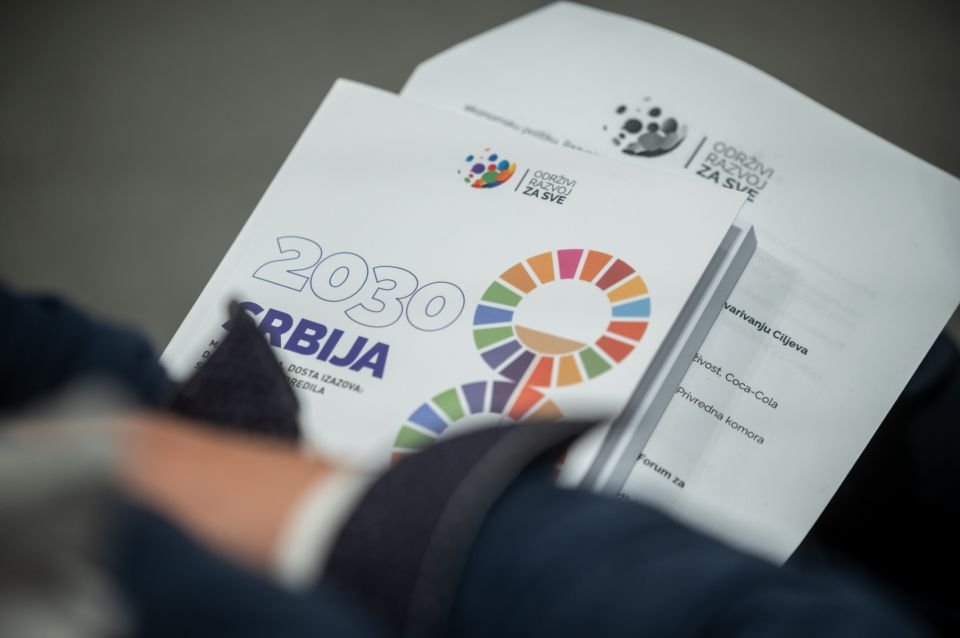At the conference held on November 15, the third consecutive report “Serbia 2030 – Many Challenges, Little Time: Is Serbia Set on its Development Path?” was presented. The report aims to provide the most important social actors, such as civil society, the business sector, the academic and research community, professional associations, the media, and citizens, with a space for broad social dialogue on the harmonization of Serbia’s development priorities with the goals contained in the 2030 Agenda for Sustainable Development, as it provides a comprehensive overview of our country’s progress in achieving the desired sustainability. The 2030 Agenda was adopted in 2015, and is based on three main pillars: eradicating poverty, protecting the planet, and ensuring prosperity for everyone. The report is structured according to eight priority units identified in the report “Serbia 2030: development priorities – non-state sector report”, which was published in 2020. Within each priority unit, an assessment of progress in certain priority sub-goals was made, as well as changes in the strategic, legislative and institutional framework for the implementation of individual sustainable development goals. Another new segment in the report is the compliance analysis of the Program of Economic Reforms for the 2023 to 2025 timeframe.
According to international reports, the Republic of Serbia has shown slight progress towards the fulfillment of six sustainable development goals, and is on the way to achieving four. The most problematic situation was assessed for Goal 13 – Climate action, in the realization of which Serbia is falling behind. This indicates that it is necessary to make additional efforts to implement the 2030 Agenda, which primarily entails setting the sustainable development goals in the national context, by adopting the Development Plan of the Republic of Serbia.
At the first conference panel, moderated by Vladimir Pavlović, program director of the Belgrade Open School, the attendees answered the question of how we are progressing in the implementation of the 2030 Agenda. It was stressed that the problems in the implementation of laws and strategies are caused by the lack of capacities, especially at the local level, with lack of finances being another prominent issue. One of the essential prerequisites for contributing to the achievement of the sustainable development goals is the partnership between civil society organizations and public authorities – this especially refers to the development of public policy documents and their application in practice, but also the transparency and timeliness of information, as without relevant data there is no meaningful decision-making process or public policies design, implementation and evaluation.
As the Belgrade Open School within the Platform “Sustainable Development for All” coordinates the monitoring of progress within the ecological dimension of sustainable development, the contribution to the Monitoring report, as well as the presentation of conclusions at the conference, were given in the context of environmental protection. Priorities in reforms must be focused on decarbonization, green transformation and circular economy. The Green Deal and the Green Agenda for the Western Balkans in the process of Serbia’s accession to the European Union represent an additional incentivizing framework for the improvement of reforms that contribute to achieving sustainability. It is important to point out that there is still a visible gap between the adoption of strategic, normative acts and their application in practice, which is particularly visible in the domain of women’s empowerment and achieving gender equality.
The conference was organized on behalf of the "Sustainable Development for All" platform. The "Sustainable Development for All" platform is supported by the governments of Switzerland and Germany, and is implemented by Deutsche Gesellschaft fur Internationale Zusammenarbeit (GIZ) GmbH, within the "Public Finance Reform- Agenda 2030" project. Partners in the project are the Belgrade Open School, the BFPE Foundation for a Responsible Society, the Center for Advanced Economic Studies, the Ana and Vlade Divac Foundation, the Center for Democracy Foundation, the Timok Youth Center, and the Smart Kolektiv.
More photos you can see HERE.
Author of the photo: Belgrade Open School

 381 60 30 65 800
381 60 30 65 800






